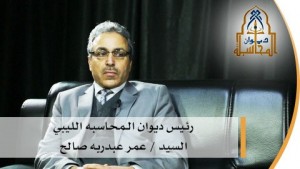By Libya Herald reporter.

Malta, 14 March 2015:
The pro House of Representatives (HoR) Audit Bureau based in eastern Libya, announced today that . . .[restrict]it has put in place a plan for inspecting Libyan diplomatic missions abroad, according to the pro HoR LANA official state news agency.
Quoting its head, Omar Abdraba Salah (Omar Abdulrabah Saleh Al-Barasi), the report said that a comprehensive plan for the inspection of embassies, consulates and Libyan overseas diplomatic missions has been put in place.
The plan will concentrate on the monitoring and oversight of the reality, work, disbursements, and work framework of diplomatic missions abroad within the parameters of safeguarding public funds, LANA reported.
The statement from the pro House of Representatives (HoR) Audit Bureau comes only a week after Prime Minister Abdullah Thinni had called on the Audit Bureau to ease its restrictions on the procedures that his government has to follow. The call had come at a cabinet meeting in Al-Beida.
Thinni’s government had felt that the strict restrictions that the Audit Bureau is insisting on imposing were handicapping the government’s performance and that such tight restrictions were unnecessary in light of the special circumstances that Libya was going through.
Thinni had tasked a committee of ministers to meet with the Audit Bureau in an effort to find a compromise whereby the government could effectively execute its duties towards the public at times of acute needs and the Audit Bureau could oversee and monitor the disbursement of public funds.
On the other hand, the parallel pro GNC-Libya Dawn Audit Bureau based in Tripoli has also been imposing its will on the executive. It had variously in January, frozen and then reversed its freeze on government accounts after it insisted that the National ID Number was used in the disbursement of state sector salaries.
It had also in January suspended five diplomats in five Libyan embassies and referred three diplomats in December to the Public Prosecutor’s Office for failing to allow Audit Bureau inspectors to examine their embassy’s accounts.
It will be recalled that there has been an ongoing tug of war between successive governments since the 2011 revolution and the Audit Bureau as the latter has attempted to impose control on government spending and procedure in the aftermath of the chaos and collapse of institutions and bureaucracies that ensued after the revolution.
Indeed, and as reported by Libya Herald at the time, this battle has been ongoing since the Ali Zeidan government which had complained back in 2013 about Audit Bureau restrictions.
Moreover, until a constitution is drafted and a fully mandated government is elected, successive governments since 2011 have had to continue to work using Qaddafi-era Audit Bureau regulations and legislation.
It must also be recalled that the GNC-Libya Dawn militia occupation of Tripoli in the summer of 2014 has further weakened Libya’s fragile and nascent institutions as both opposing political coalitions have now set up parallel Central Bank of Libya Governors, Audit Bureau heads, as well as the two contending Prime Ministers, governments and parliaments. [/restrict]








